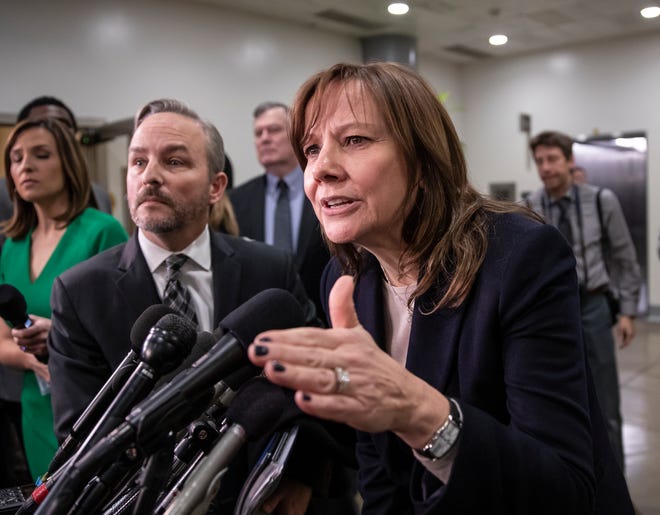GM's Barra defends plant closings to Mich. lawmakers
 Keith Laing
Keith LaingWashington — General Motors Co. CEO Mary Barra defended plans to idle five plants, lay off 6,000 salaried employees and imperil the jobs of 3,300 hourly workers as she met Thursday with members of Michigan's U.S. congressional delegation.

Speaking with reporters after an hour-long closed meeting with Michigan's U.S. senators and most of the state's U.S. House delegation, the GM chief said she conveyed to lawmakers that the moves she has made are intended to help the company respond to shifts in market trends and improve its overall capacity.
"We had really productive discussions, and I think they have a better understanding of what we're doing and why, and how we're making sure that we're supporting the displaced workers, especially at the plants that are impacted, " she said. "And I have an understanding and appreciation of some of the challenges they are working on. As always, when you communicate, you find ways to improve the situation, so I'm very happy to have had the opportunity to meet with as members of Congress as I did."
Lawmakers are furious at GM for moving to cease production next year at its Detroit-Hamtramck and Warren Transmission plants in Michigan; at Lordstown Assembly in northeast Ohio; at Baltimore Operations in Maryland; and at Oshawa Assembly in Ontario.
Work will stop next year at predetermined dates, but plants will not officially close. The future of those facilities will be determined during 2019 negotiations with the United Auto Workers union.
The company is planning to lay off nearly 6,000 salaried workers next year after a buyout program last month only had 2,250 takers, according to a memo sent to employees by CEO Mary Barra and obtained by The Detroit News. The salaried buyouts and the layoffs together will affect 8,000 North American employees and a number of global executives, none of whom are part of the senior leadership team.
Lawmakers lamented the fact that GM has cited excess capacity as part of its rationale for idling U.S. plants, but the company chose earlier this year to build its second-coming of the Chevrolet Blazer in Mexico.
"General Motors is an American company," said U.S. Sen. Gary Peters, D-Bloomfield Township. "That means they should hire American workers, and whenever there is an opportunity to move production, with SUVs and others that are being made in Mexico, that production needs to come back to the United States.
"There was a recent decision to make the new Chevy Blazer in Mexico," he continued. "They moved production for that Blazer to a factory that had excess capacity, whereas we had excess capacity in the United States. The Chevy Blazer should be made in the United States, with American workers."
U.S. Sen. Debbie Stabenow, D-Lansing, added: "She is certainly keeping an open mind in general, and she was very strong about her commitment to Michigan. We were also very strong (in saying) that that's our expectation."
Barra defended the decision to build the new Blazer in Mexico, citing other products the company is planning to produce in the U.S.
"The decision of where the Blazer was built, that was made many years ago," she said. "At that time Lordstown. for instance, was running full out of three shifts. The market has changed dramatically. But in this country, we have just launched the Cadillac XT4 that is being built in Fairfax, Kansas.There's another product we think has been announced that's going to be coming out built in Spring Hill.
"We have products being built in Lansing Grand River," she continued. "We just invested a tremendous amount of money to expand our capacity to build heavy duty trucks that we just launched this week in Flint, Michigan. We have additional jobs that were available with all the investment we made in Fort Wayne, Indiana, for the full-size light duty trucks, and coming at the latter part of this year, we are going to be launching new full-size SUVs, and that's an expansion in investment."
U.S. Rep. Tim Walberg, R-Tipton, was seemingly more understanding of GM's position than his Democratic colleagues, but he also lamented the surprise nature of GM's decision.
"She has to run the company," Walberg said. "We're not running the company. We're concerned about our constituents and how they are treated. We're concerned about the fact that communication wasn't normal for what we would expect out of an auto company. With us, we want to be part of the whole solution and the process to the best of our ability to support our constituents as well as the company that we want to see succeed."
klaing@detroitnews.com
(202) 662-8735
Twitter: @Keith_Laing